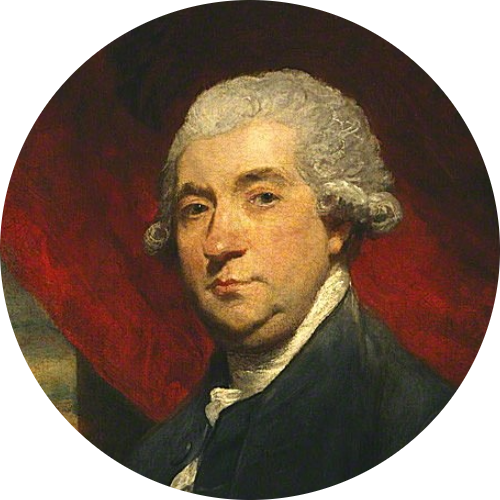Advocate. Son of Andrew Crosbie of Holm, sometime Provost of Dumfries, and Jean Grierson. Married to Elizabeth Barker.
Crosbie was a law student at the University of Edinburgh, and he was admitted to the Faculty of Advocates in 1757. He became established as an able if unconventional advocate during the 1760s, and frequently worked together with James Boswell in the late 1760s and 1770s. In the 1780s he was a co-founder of the Royal Society of Antiquaries in Scotland as well as of the Royal Society of Edinburgh, of which he was elected Vice-Dean in 1784 shortly before his death.
According to the History of the Burgh of Dumfries, Crosbie
"was a successful lawyer, and justly looked upon as one of the most eloquent pleaders of his time, at the Scottish bar. As many of the incidents in "Guy Mannering" occurred in Dumfriesshire, it was all the more natural in Scott to take the ablest lawyer of the County as the prototype of the learned, witty, and benevolent advocate who had the Ellangowan family and Dandie Dinmont for his clients. In these respects the character of Mr. Crosbie corresponded pretty closely with that of Paulus Pleydell, Esq., in the romance."
Similarly, the editors of Boswell in Search of a Wife described Andrew Crosbie as "a fine but erratic lawyer".1
Crosbie lost most of his fortune as a consequence of the bankruptcy of the Ayr Bank in 1773, and "[w]hen he died left so little to support his widow that she was obliged to apply for a pension of £50 a year from the Faculty of Advocates"2
James Boswell and Andrew Crosbie were professional colleagues, who shared a taste for impossible cases. Boswell secured the assistance of Crosbie for the John Reid case, one of Boswell's first. In the words of Brady and Pottle in Boswell in Search of a Wife "Boswell and Crosbie presented no witnesses at all, but talked to such good effect that the jury returned a Scots verdict of "Not Proven", whereupon Reid was discharged."
On August 16, 1773, Crosbie came to supper at Boswell's Edinburgh home in honour of Dr Johnson's visit there, a few days before Johnson and Boswell set out on their tour of Scotland. Also present were the noted physician William Cullen, his son advocate Robert Cullen, and the philosopher Adam Fergusson. During supper, Crosbie said, he thought it the greatest blasphemy to suppose evil spirits counteracting the Deity, and raising storms, for instance, to destroy his creatures. Dr Johnson, while not defending the opposite position, criticised Crosbie's reasoning, as is recounted in Journal of a Tour to the Hebrides.
Boswell made another mention of Crosbie in the Introduction to his Journal of a Tour to the Hebrides, which was first published a few months after Crosbie's death in 1785, when, as a comment to Johnson's supposed dislike of Scotland and other countries, he wrote that "I subscribe to what my late truly learned and philosophical friend Mr. Crosbie said: that the English are better animals than the Scots; they are nearer the sun, their blood is richer and more mellow; but when I humour any of them in an outrageous contempt of Scotland, I fairly own I treat them as children. And thus I have, at some moments, found myself obliged to treat even Dr. Johnson."
[This biography is to be expanded.]
